Manuel Muguerza Solis III
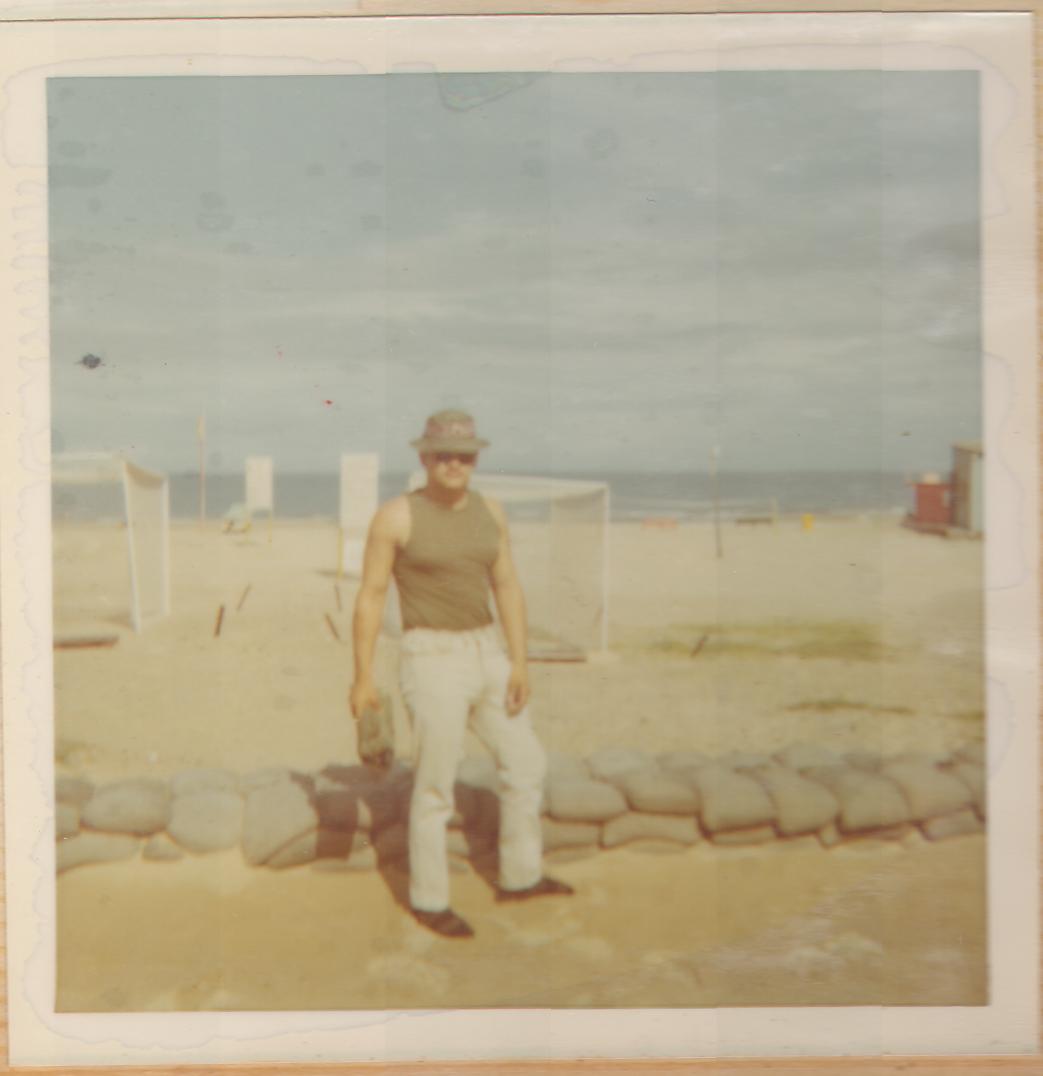

What did you know about the Vietnam War before you went?
I hardly knew anything. I saw the protesting on TV but I wasn't interested in that. I was still a teenager and I was a senior and graduated at eighteen but I didn't really know what was going on. While I was in high school no one really mentioned it. Yeah I heard about a guy who went into the military and then I found out later on he got killed there. But it was something I never thought of until I got there.
How well prepared were you as far as basic training?
At basic training they taught us a lot. We had no more than two weeks they taught how to march left right and all this formal stuff. The rest of the time we were shooting weapons. We shot weapons every day and all kinds of weapons from the 45 all the way to the M60. We had jungle training and how to capture a village and all that. To me at the time it all felt foolish but it all came in handy. Then we had training escape and evade. If we ever got capture it showed us to escape, evade and how to survive. So all of that came in handy because it was like something you don't use everything but when you need it it's there.
What were your thoughts when you first arrived at Vietnam?
I felt like I was in a bad dream. I can't believe I'm here. I didn't know much about it except for what I had heard. The more information I got was when I was in basic and that was still hard to believe. But once I got there I stayed in a holding compound in Cam Rah Bay and I realized that I was in a war zone. Finally I got into my permanent unit and got settled.

What jobs and duties did you have to do when you were at Vietnam?
I had several jobs. When I was at AIT (Advanced Individual Training) I studied to be an air craft electrician since I figured that was going to be a good civilian service job. But at that time after I graduated I was going to get promoted and then had flight school to be a door gunner on the huey helicopter. So when I arrived at Vietnam instead of being an aircraft electrician I ended up being a door gunner on the huey helicopter. I did that for about the first eight to nine months but then I couldn't fly anymore because I had to many concussions. Once we would fly in a certain altitude my nose and ears would bleed. Then I also had guard duty and other stuff I had to do.
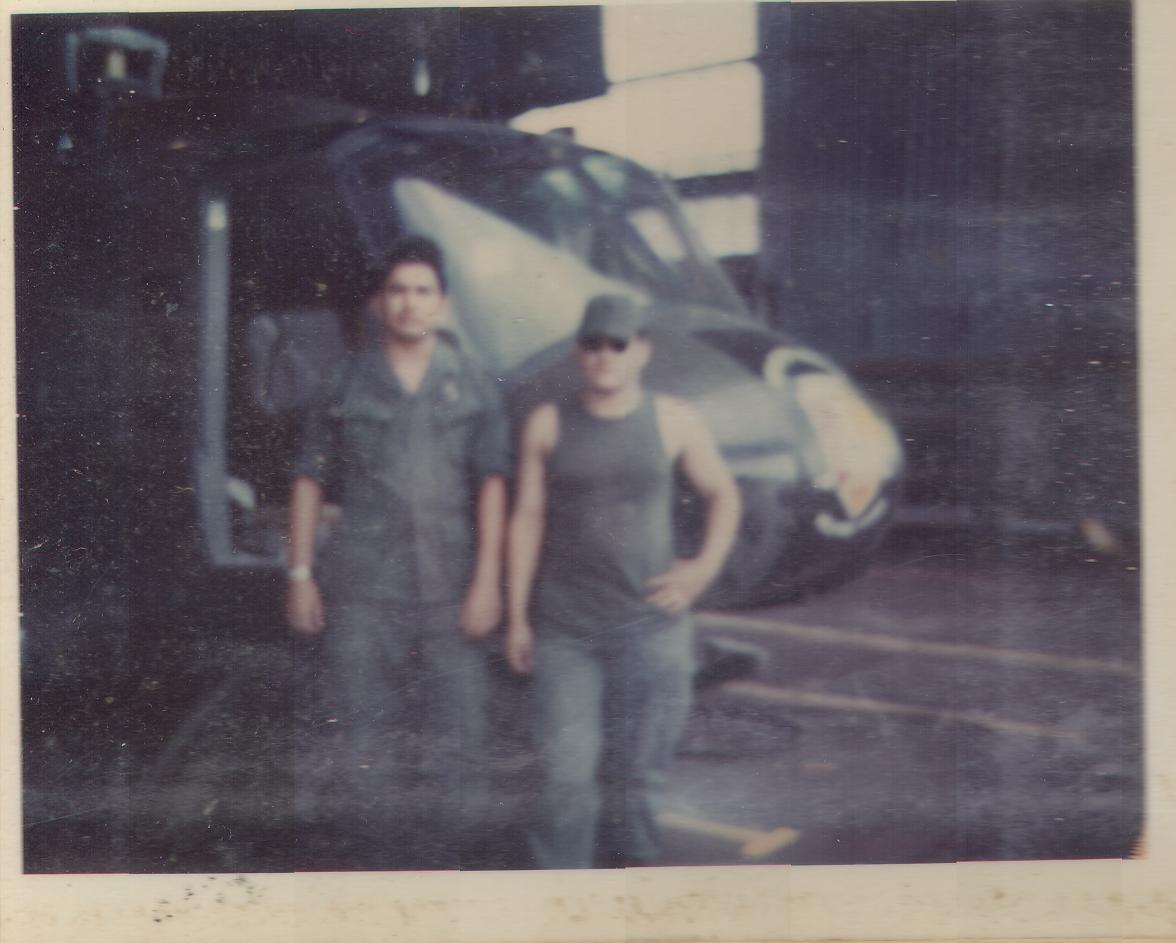
During down time when you were not in the field what did you do?
Well in the beginning we would sit around and have a couple of beers but we couldn't be hung over because we needed to focus. I would write to my mom and sister during down time. There wasn't much to write about you did the same thing every day so my letters were short and simple. You didn't want to write about the killings or anything like that. But then after all my fighting duties were over I ended up in Vung Tau which was an R & R Center (Rest and Recuperation). At the R & R we would hang out and watch a band with go go dancers perform. I met more Latinos there and we started this group called the BBU's (Brown Brothers United).It was just a title someone came up with. We would talk in Spanish as much as we can. We would get together to just try and keep our culture together. That kind of saved my life well my sanity you can say. A lot of soldiers would wear on one side of them the American flag or if they were Italian they would wear the Italian flag just cause they wanted to be proud of their heritage. And we didn't know what to put. We thought hey we are Mexicans but we are Mexican Americans. At that time we were calling each other Chicanos, Chicano power and Brown power and stuff like that. So this one guy who was an artist painted a Mexican flag and instead of the Mexican brown eagle they have in the middle he put the Cesar Chavez eagle which was more what we were the Chicanos. So that was the Chicano flag. So it gave us a nationality and something to be proud of. It helped us at Vietnam because we had to do and say things that were insane so that we can remain sane. There were things we did there that we could not do here. So to keep our sanity things like that helped us get through.
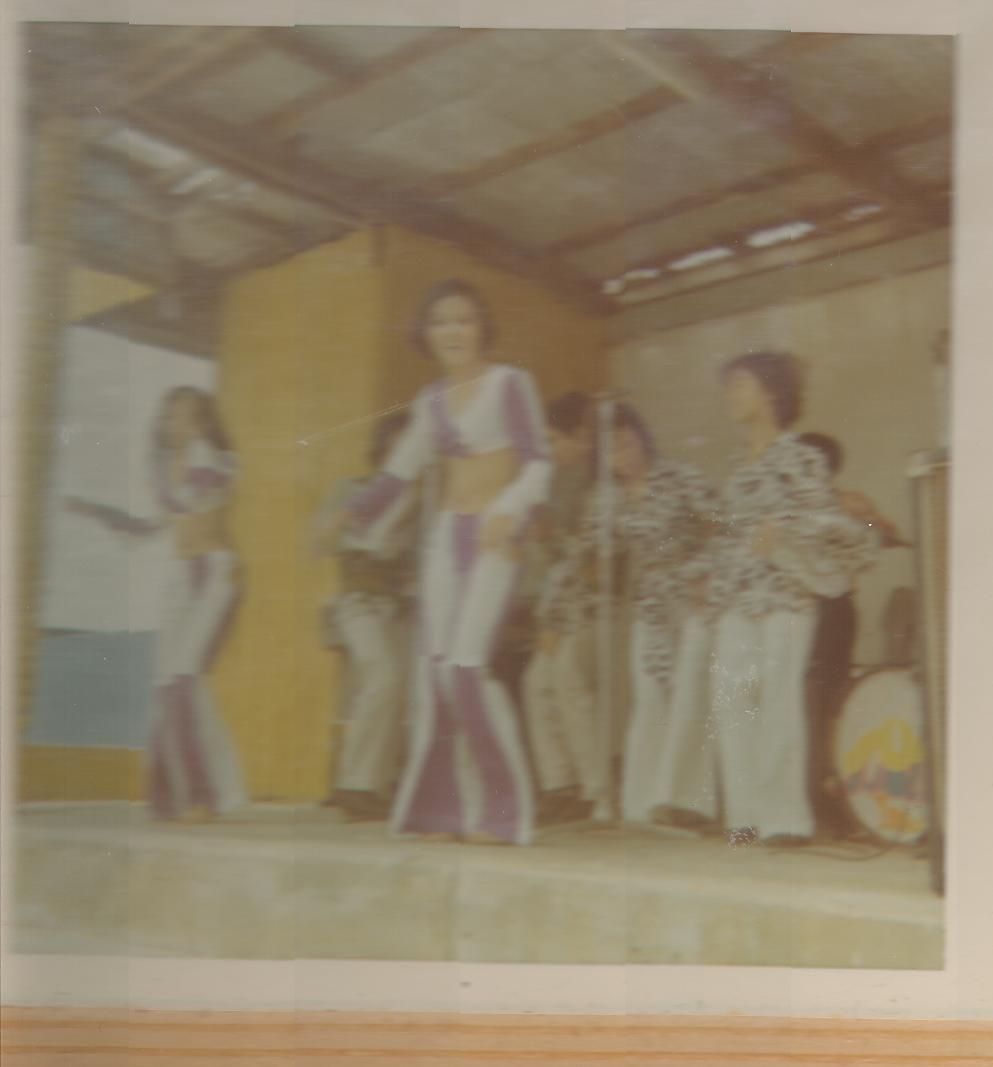
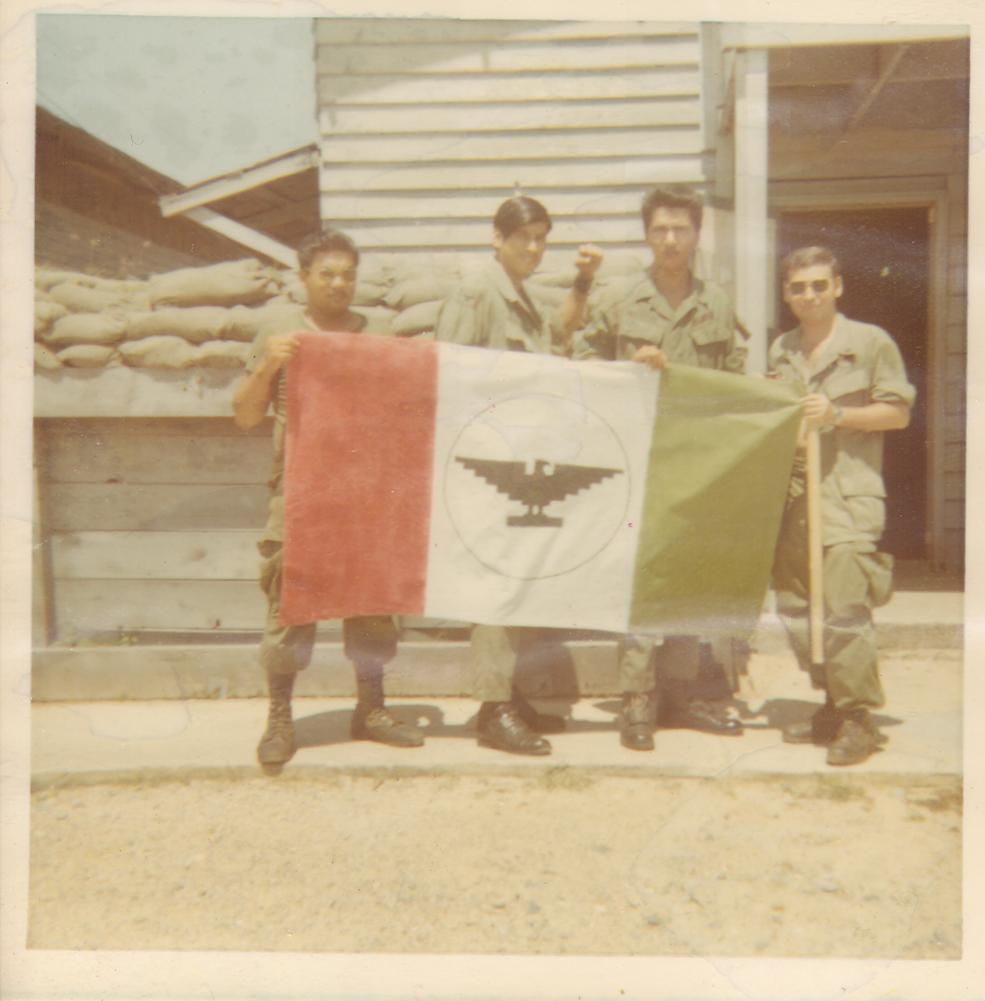
Are there any stories you can share with me?
There was a time when I was going to go to bed already and had just got out of the shower. We would sleep with our boots on just in case. Since I had just got out of the shower I didn't have everything on. Then we had incoming (bombs) so my hooch-mates took off running since they had there boots and clothes on. I didn't even put my pants on I just put my boots on and just laced them I didn't even tie them. My hooch-mates weren't that far ahead of me. So when I was running I tripped and I stepped on my shoelace and fell flat on my face. As I looked up I saw a round hit them. They were running to the bunker so when I saw that I just stayed there. So then I got up and medics were coming. They thought I was hurt but I was just scared really. Then I started talking and got my senses back and was able to hear again. Then one of the medics asked if I knew the guys and I said some of those guys are my bunk mates. The medic asked if I could help put them in body bags. I was like oh man, cause they were in pieces it wasn't like the whole body it was body parts. And like a puzzle I had to put them together and figure out who was who. That was very disturbing. I didn't do it all I just did a couple of them and took off. It was to hard I couldn't do it all. It was bad and that's why I am the way I am.
Can you explain what the Agent Orange was? And did it effect you?
Well Agent Orange was chemicals used to destroy crops. I was fortunate that when I was at Vietnam they stop spraying it. So I did not get effected by it. But I did know guys who did. They were the guys who were installing it in the sprayers or guys who were on the ground who came across it. It caused a lot of symptoms if you were contaminated with that. You could get some form of cancer or your children could be born deformed or disabled. Some men became sterile or had skin conditions. But I was lucky I didn't get effected by it.
I heard many men came back with health problems did you?
I came back with a form of PTSD (posttraumatic stress disorder) and bad knees. My health internally is good I do not have diabetes or anything like that. But I do see a psychologist and take medication for my flash backs. I used to get night mares and wake up screaming and hollering. But I got medical help and I am fine now. But I am very fortunate that my disabilities are not as bad as others. There are some guys who have 100% PTSD and I feel sorry for those guys because they have to depend on others and cannot do for themselves. I got hurt and Uncle Sam gives me compensation for it so I receive VA benefits which plays a big role in life today.
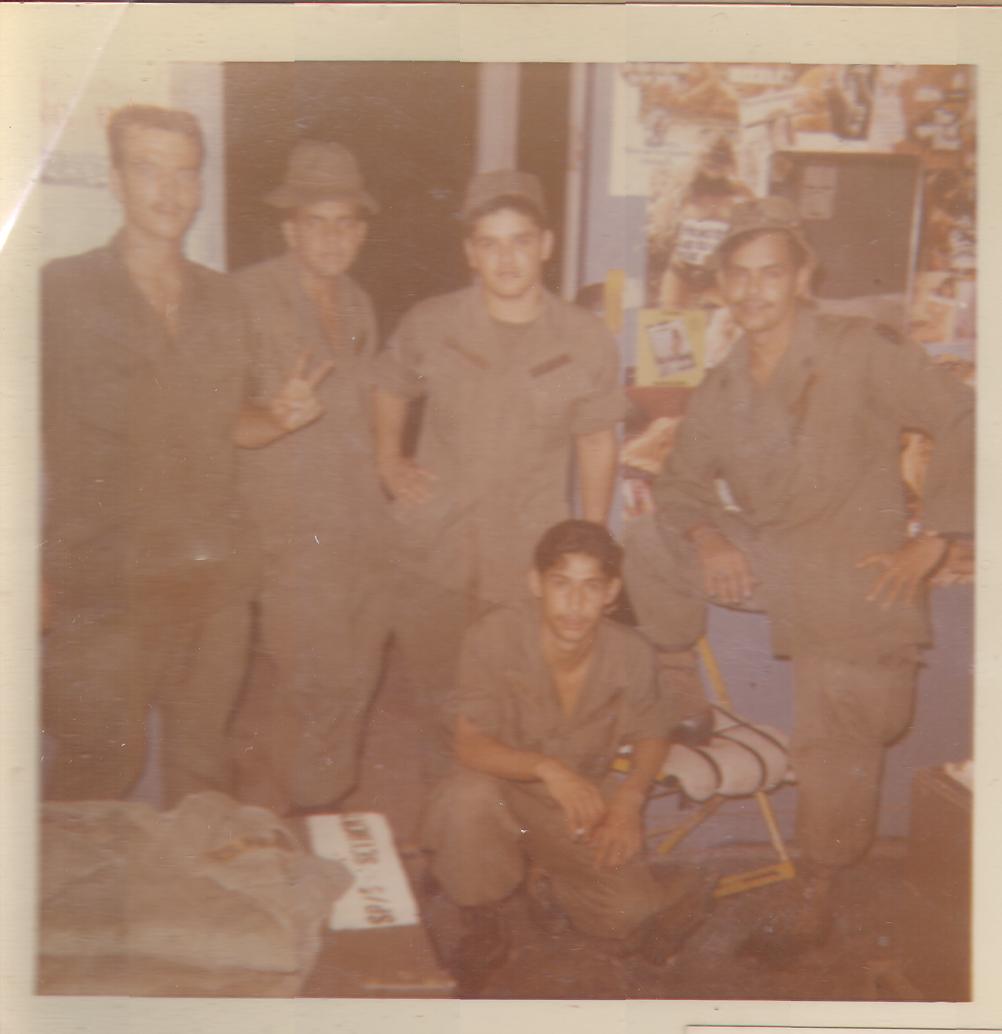
After you returned from the Vietnam War how did people treat you?
Well I went to Vietnam twice and the first time it was unexpected. When we landed at the airports there were a lot of protesters and we were spit on. It was like how you saw on TV it was true. We were called baby killers. It was very degrading. I was expected the opposite like cheering and a welcome back but we never did get that. We used to hide and not let the public see us. When I came back the first time people were afraid of me and caution not to associate with me. It was hard because it was friends and family. Then I went back and came back a second time. The way we were treated all of us it was terrible. What we do now we are against the war but we are for the warriors. But back then they were against the war and the warriors. So the way they were protesting against the war they were actually protesting against us also. We never got our welcome home and if they did it was to late.
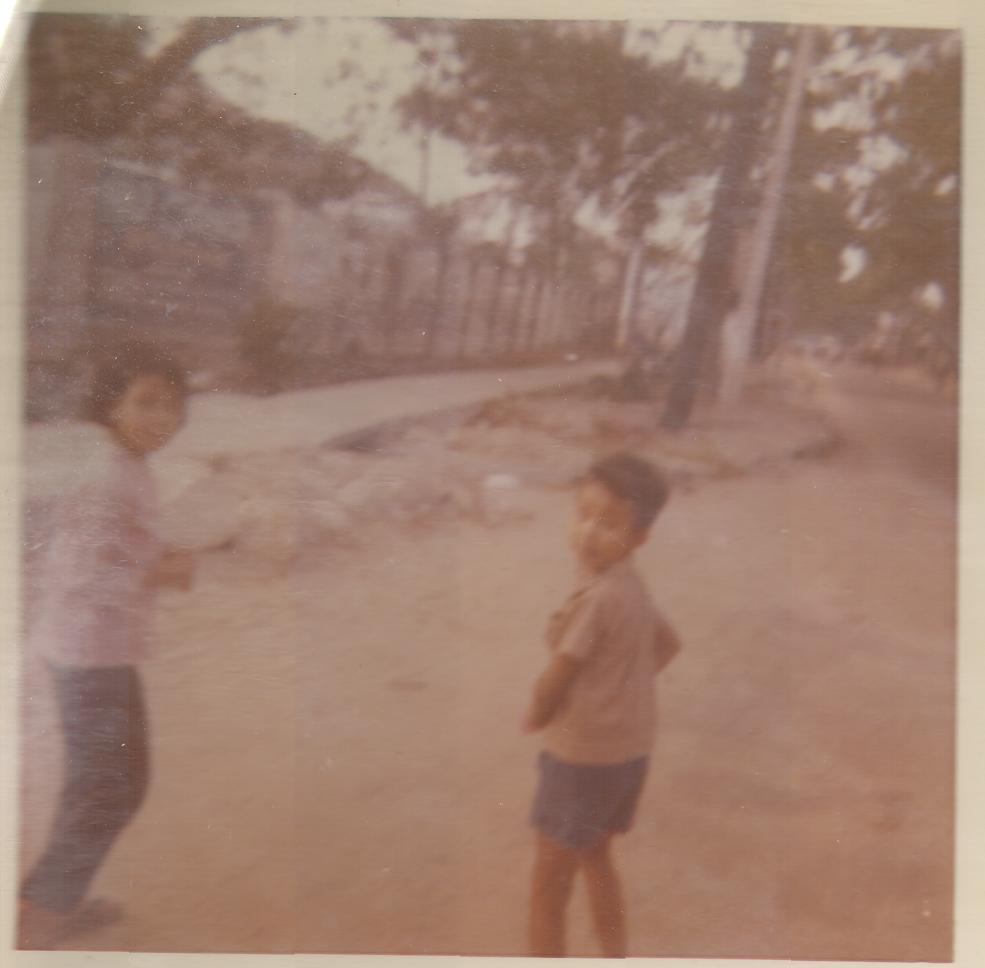
How is life for you now after what you have seen and live through?
Well after say my ten or fifteen years of insanity from Vietnam it was harsh. I tried to fight it on my own but then I got help from the VA and started taking medication and seeing a psychologist. But now these past fifteen years or so I am a better man. I am a better husband and great father and grandfather. I am doing better I am not getting flashbacks that is my past. Now I am living like everyone else trying to maintain. Now I spend a lot of time with my grandchildren. When I am not with them I have a meeting once a month with Post 76 VFW. We talk about different things that happen during the month. We have fundraisers, different programs and outreach to different veterans in need. To me it is very important I got help when I needed it and now I repaying it by helping others.
Is there anything else you would like to add to this interview?
Well I am glad you're doing this. It is not just about me your uncle it is also about Vietnam. Even though it has been a long time people should never forget about what happen with us so it will not happen again. With what's going on now with these warriors that are coming home having the media and family meet them at the airport it is a beautiful thing. Or when the warrior surprises there family when they get back. That is something I wished happened to us but since it didn't happen to us I'm glad they recognize that and doing the opposite now. The warriors that are coming home deserve everything they can get since they still have a long life to give.
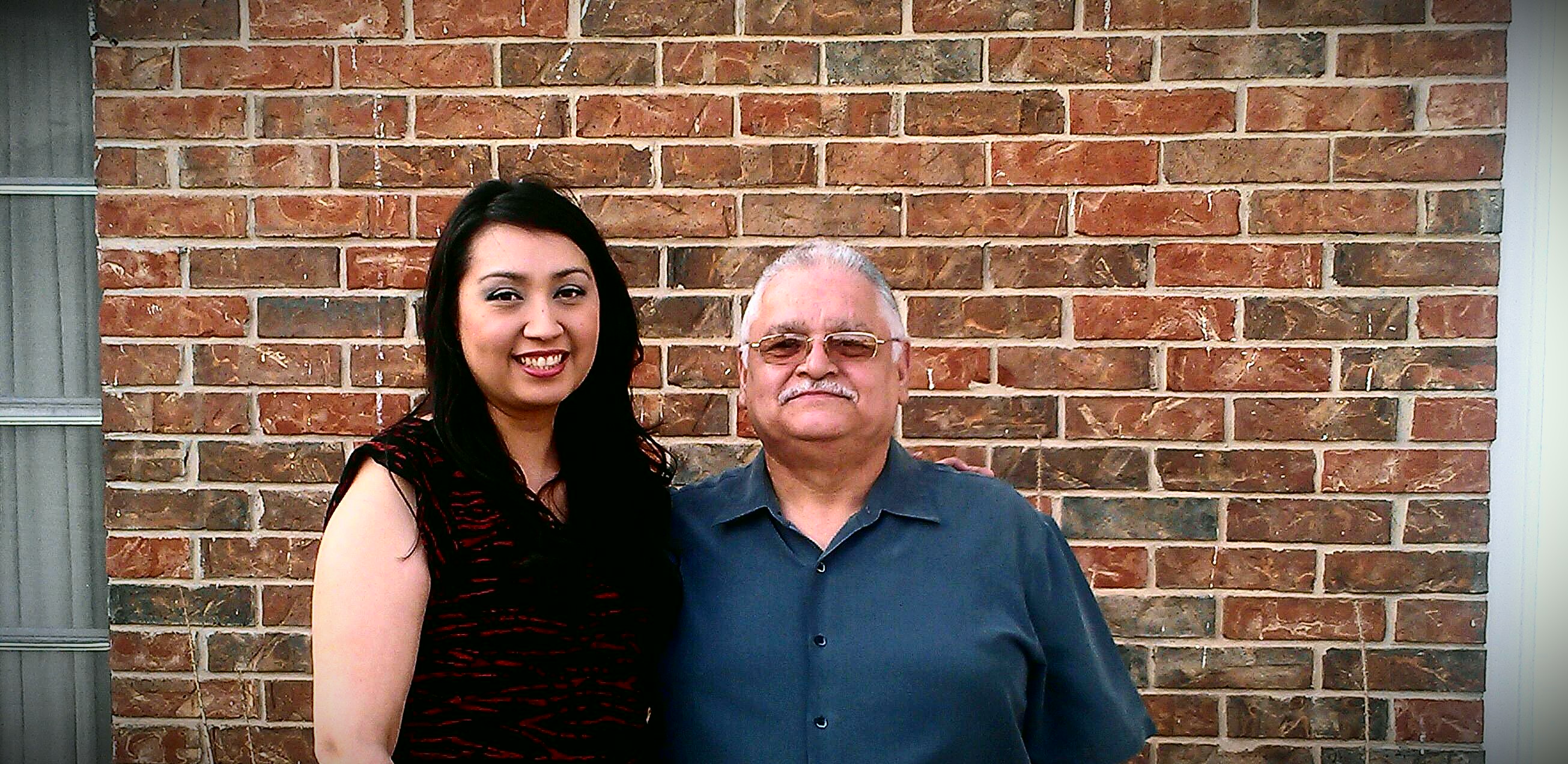
List a minimum of FIVE sources. There must be links to each of the sources within the transcription.
Here are three examples of annotated sources plus a source for photos/documents.
Vietnam War This website provides information regarding the Vietnam War such as films, maps and timelines.
V.A. This website informs people of what the U.S. Department of Veterans Affairs offers for healthcare.
VFW Post 76. This website is about the oldest VFW post in Texas and the services it provides for Veterans.
R & R Center. This website shows the different rest and recuperation centers that were available for troops.
Post-Traumatic Stress Disorder(PTSD). This website provides information regarding PTSD in which many Veterans such as my uncle suffer from.
Photographs and/or documents on this website were provided by Robin Marie Cantu and Manuel Muguerza Solis III.